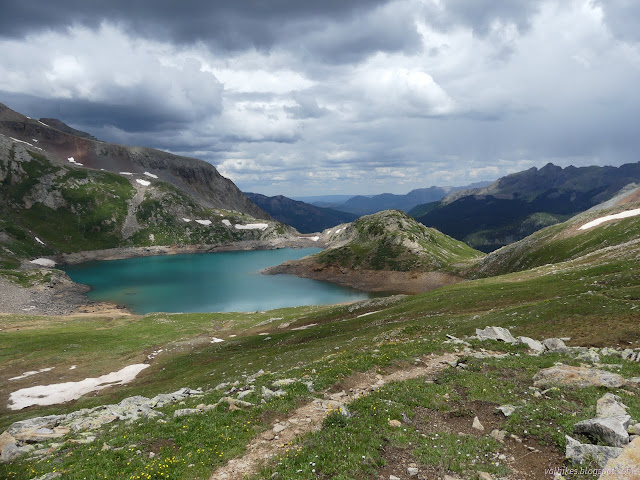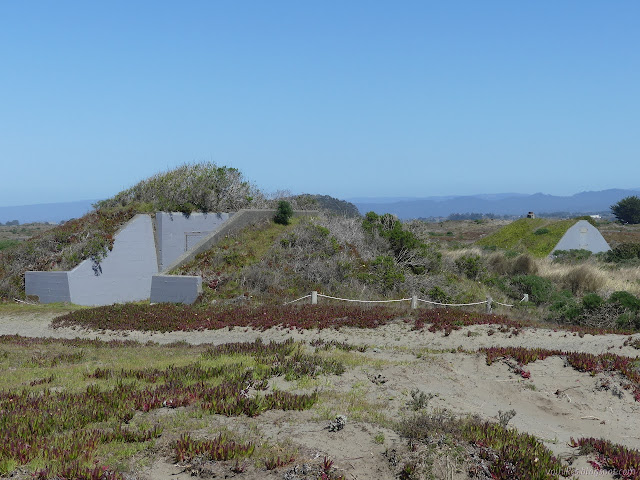Will Rogers State Historic Park
Map the trailhead.
It seems it is about time for another Rustic Canyon hike for Hike the Geek. Apparently some people hike down from the road into the canyon and call that the Rustic Canyon hike, but the geeks, or particularly the leader, like the hike I've done before for its variation in terrain type. The hike starts off at the tended green of polo fields, then climbs up to the Backbone trail for a little way before dropping down into the canyon. The canyon starts off wide and lush and narrows into a stony V, but is still rather lush.
I got there very early, so sat down by the polo fields where they were actually playing polo. Horses running up and down the field and then at the half, the folks in their summer dresses and wedge heels came out onto the green, champagne in hand, to stomp divots. There was also a contest to find a cork hidden beneath a divot. Someone won and the folks meandered back to the side for the entertainment to start. That was a fellow with trained horse and rope tricks. The horses had quite a rest before the next bit of play.
 |
| Actual polo actually being played on actual polo fields of Will Rogers State Historic Park. |
|
Then when folks showed up, we took off up the trail. We took the small trail instead of the fire road right or left. This got us to the fire road again very quickly and soon after, to the Backbone trail. This route was much shorter than the fire road to the right, but much less of the barns could be seen. We made fairly quick time up the Backbone trail. We crossed the bridge and climbed the hill and looked back to see all kinds of fog rolling in although it was plenty warm where we were.
 |
| Looking back to the fog rolling in past the bridge along the Backbone Trail. |
 |
| Marker set into the top of the hill above the bridge, a slight prominace higher than the local ones, which only identifies it as "Topanga Canyon", which it clearly isn't. |
Soon after the peak, we found the unmarked trail heading down off the ridge and into Rustic Canyon. The trail is so steep it seems longer than it is and a controlled descent can be hard work. It didn't seem quite as bad as I remembered, but still was very glad to be going down instead of up. Reaching the mercifully flat bottom below and joining the trail through the canyon, a sign marked the connector as only 0.4 miles.
We didn't head up the canyon to the boy scout camp, but did take a look around the structures. The first is right at the junction and surrounded by barbed wire with an open gate. It was well constructed with nice tile shingles before it was left to rot. Further on, a power station is now an ever changing art exhibit. A group of women who were down decided to add to a bit of it, perhaps using found paint, perhaps having brought some of their own. And then there's a building that is a huge mass of metal of unknown function. Then some more mundane buildings.
 |
| Abandoned structure at the trail junction. It seems to have stalls inside so it was probably a barn. This is its good side as the roof has fallen in at the far corner. |
 |
| A bit looking much like an engine littered along the trail. |
 |
| The initially dry creek emerges from underground giving us our first glimpse of water. |
 |
| An all metal building that includes a section over the road. Someone built it so that the walls were very strong, but must not have put as much effort into the connections. |
 |
| Nice, strong, corrugated metal walls displaying weaknesses. |
 |
| The only place that actually looked like it was once a house. Two chimneys were standing among the vanished walls. Also a washing machine at one end of the foundation and a stove at the other could be found. |
We climbed down to the stream as the road could be seen turning up, but that's too soon as there is trail along until the small dam. We eventually rejoined the trail, which was easier travel than the stream had been. Tree obstacles were only every 100 feet instead of every 20 feet. More barns were along there. Coming to the dam, we stopped, then went down the right and came back up to the bottom. It looked like slightly scarier routes down on the left also exist.
 |
| Looking down the dam into the pool below. |
 |
| The last few of the stairs on the way down the trail from the top of the dam. We didn't use these, but the others were quite nice to have. |
 |
| Coming back up the canyon to the water falling over the dam. Being in the stream bed can be hard going. |
 |
| Curiously, this is a growing waterfall, so there is now natural rock on top of the cement barrier, both at the main flow and at a second to the right coming through a hole. |
Continuing down, the canyon narrows tightly. This time, there were no incidents with poison oak being near the face and the choice of waterproof boots meant I could take wet but safe footing over a few chunks of concrete embedded with slick rocks. Now if I could figure out how to prevent the likely wasp from flying so badly it runs squarely into my neck and then dropped down my shirt to find something to bite, because that was all kinds of pain although just a very few nerves speaking it.
The canyon opened up just a little bit more and our journey was nearly complete. The trail snaked back up the side of the canyon to come out on the far side of the polo field. This one had many bridges over sharp ravines and sections of trail built so they wouldn't wash away and even railings. It's very curious compared to the state of the trail further on, like they spent all the money they had for trail building on the first section then only had enough for a few signs. Done with the hike, we filtered off to our cars. I stopped to wash my hands with much soap because I had noticed after brushing something aside that it was poison oak.
©2011 Valerie Norton
Posted 15 August 2011

















Comments